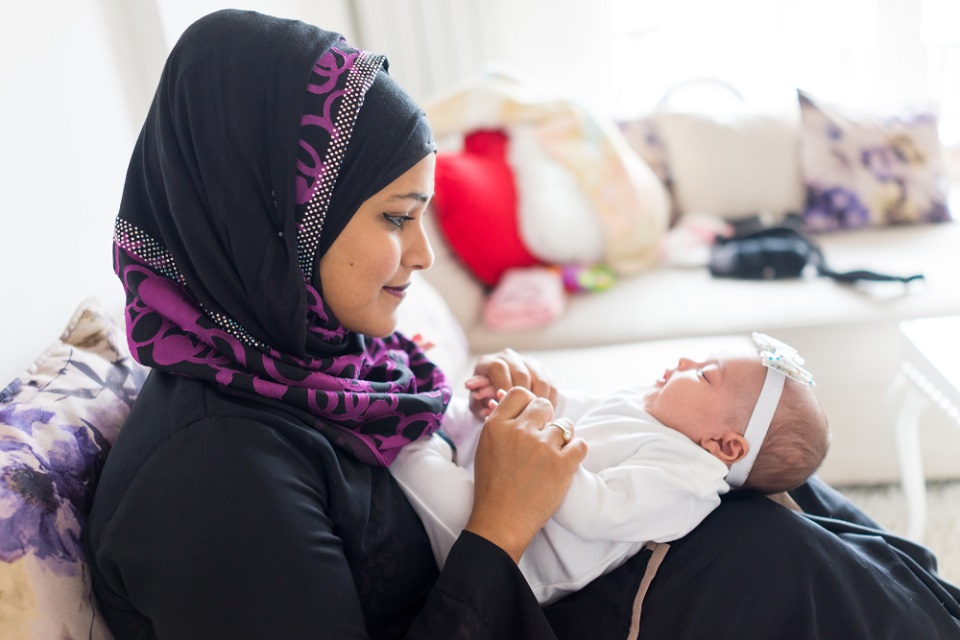Researchers publish results of largest ever study on British South Asian maternal mental health

An extensive trial into postnatal depression in South Asian women has found that tailored support can make a difference to their recovery.
Co-authored by Keele’s Professor Carolyn Chew-Graham, ROSHNI-2 is the largest study of its kind ever conducted, which saw 4,000 participants recruited from across the UK to test a culturally adapted talking treatment for postnatal depression.
The ‘Positive Health Programme’ was developed specifically for British South Asian women and was compared to the usual treatment provided by a GP. The aim was to find out if the group talking treatment worked and if it provided value for money, with the results now published in The Lancet.
Currently, British South Asian women are the largest ethnic minority group in the UK and are statistically more likely to experience mental health issues. However, they present to mental health services at a considerably lower rate than white women.
The reasons for this are complex and include factors such as family engagement, language barriers, cultural perceptions of mental health, and a lack of culturally sensitive services.
To help overcome these barriers, the ROSNHI2 study pioneered a culturally adapted model of recruiting, engaging and retaining research its participants, called the ‘Positive Health Programme’.
The study was led by researchers from Lancashire and South Cumbria NHS Foundation Trust (LSCft) alongside other NHS Trusts, and higher education institutions from across the UK including Keele.
They found that more women in the Positive Health Programme group recovered quicker and significantly, compared to those in the treatment-as-usual group. By 12 months, the women in the Positive Health Programme group continued to stay well, but by that time the women in the usual treatment group also recovered.
The results should help develop future care in this group of women, typically seen as a ‘hard to reach’ cohort, and recommendations have already been made to health care policy makers to ensure culturally sensitive treatment options are available for British South Asian women who experience postnatal depression.
Professor Carolyn Chew-Graham, Professor of General Practice Research, said: "Postnatal depression impacts on not only women, but their baby and the wider family. It is important that interventions to support women are culturally-sensitive and acceptable.
“The Positive Health Programme in ROSHNI-2 (roshni means 'light' in urdu) was specifically developed for women of South Asian origin and was found to be effective and acceptable to women in our trial. I hope this research contributes to guidelines and influences commissioning of services for women in the perinatal period."
Farah Lunat, Research Operations Manager LSCft and joint-lead author of the study, added: “British South Asian women represent a significant population in the UK, and we know they are at a higher risk of postpartum depression, yet there has not, to our knowledge, been any other large-scale research into how we can better support them. This has to change and ROSHNI-2, signals the start of this change.
“Perhaps even more significant than the positive mental health outcomes of this research, the ROSHNI-2 trial has proven that inclusive research is possible.
“Ethnic minority communities that are so often labelled as “hard to reach” are, in fact, ‘easy to ignore’. There is a need for a shift in attitudes amongst healthcare professionals, academics and service providers – ROSHNI-2 has proved that a culturally inclusive approach to research does work and has huge potential benefits to improving access to healthcare for underrepresented communities.”
Most read
- Keele University partners with Telford College and NHS to teach new Nursing Associate apprenticeship in Shropshire
- Emotion aware chatbot developed by Keele scientists offers transformative potential for mental health care
- First study of its kind sheds new light on Britain’s ‘forgotten’ World War Two decoy sites
- Keele cardiologist travels to Ethiopia to improve care for heart patients
- Keele academic wins prestigious prize for short story set in Stoke-on-Trent
Contact us
Andy Cain,
Media Relations Manager
+44 1782 733857
Abby Swift,
Senior Communications Officer
+44 1782 734925
Adam Blakeman,
Press Officer
+44 7775 033274
Ashleigh Williams,
Senior Internal Communications Officer
Strategic Communications and Brand news@keele.ac.uk.

